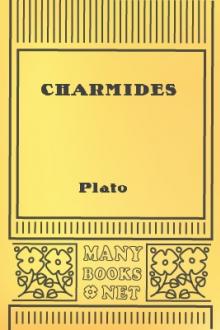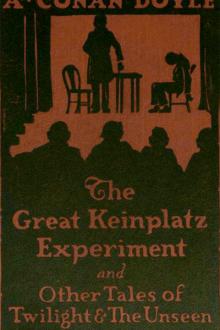Genre Fiction. Page - 238

ot worthy of much consideration. For why shouldAristotle, because he has quoted several Dialogues of Plato, have quotedthem all? Something must be allowed to chance, and to the nature of thesubjects treated of in them.) On the other hand, Mr. Grote trusts mainlyto the Alexandrian Canon. But I hardly think that we are justified inattributing much weight to the authority of the Alexandrian librarians inan age when there was no regular publication of books, and every temptationto forge them; and in which the writings of a school were naturallyattributed to the founder of the school. And even without intentionalfraud, there was an inclination to believe rather than to enquire. WouldMr. Grote accept as genuine all the writings which he finds in the lists oflearned ancients attributed to Hippocrates, to Xenophon, to Aristotle? TheAlexandrian Canon of the Platonic writings is deprived of credit by theadmission of the Epistles, which are not only unworthy of Plato, and inseveral passages plagiari

During the years he had served as master of fence at the English Court, thesons of royalty had learned to thrust and parry and cut as only De Vaccould teach the art, and he had been as conscientious in the discharge ofhis duties as he had been in his unswerving hatred and contempt for hispupils.
And now the English King had put upon him such an insult as might only bewiped out by blood.
As the blow fell, the wiry Frenchman clicked his heels together, andthrowing down his foil, he stood erect and rigid as a marble statue beforehis master. White and livid was his tense drawn face, but he spoke noword.
He might have struck the King, but then there would have been left to himno alternative save death by his own hand; for a king may not fight with alesser mortal, and he who strikes a king may not live -- the king's honormust be satisfied.
Had a French king struck him, De Vac would have struck back, and gloried inthe fate which permitted him to die for the honor of France; but an EnglishK

mouth and forked tongue thrust out. I painted the eyes red for anger.
"'There, stand so!' I said, 'and glare and hiss at my foes.'
"In the stern I curved the tail up almost as high as the head. There I put the pilot's seat and a strong tiller for the rudder. On the breast and sides I carved the dragon's scales. Then I painted it all black and on the tip of every scale I put gold. I called her 'Waverunner.' There she sat on the rollers, as fair a ship as I ever saw.
"The night that it was finished I went to my father's feast. After the meats were eaten and the mead-horns came round, I stood up from my bench and raised my drinking-horn[3] high and spoke with a great voice:
"'This is my vow: I will sail to Norway and I will harry the coast and fill my boat with riches. Then I will get me a farm and will winter in that land. Now who will follow me?'
"'He is but a boy,' the men said. 'He has opened his mouth wider than he can do.'
"But others jumped to their feet with the

nt. I should say, in the neighborhood of one o'clock, but of course we can't be absolutely certain."
Gaunt had approached the body, and was passing his fingers lightly and thoroughly over it.
"No doubt about robbery being the motive?" he asked, as he worked.
"Oh, no," the Inspector put in, easily. "No weapon found, window open, tracks before window in the carpet and on the curtains, and Mr. Appleton's jewelry and money gone."
"I understand." Gaunt bent and sniffed the powder-blackened shirt about the wound. "Looks as if Mr. Appleton might have recognized, or thought he recognized, the thief, doesn't it, when he let him get as near as he did to shoot him, without attempting to get on his feet, or make any outcry?"
'"Maybe he did jump to his feet, and fell back again when he was shot?" suggested the Inspector, thoughtfully.
"Hardly, seeing the way he was clutching the arms of the chair. Even death didn't release that vise-like grip. He might have clutched his breast whe

ntry. It might, I thought, be the Happy Future, or Utopia, or the Land of Simple Dreams; an errant mote of memory, Henry James's phrase and story of "The Great Good Place," twinkled across my mind, and passed and left no light.
The man I saw wrote with a thing like a fountain pen, a modern touch that prohibited any historical retrospection, and as he finished each sheet, writing in an easy flowing hand, he added it to a growing pile upon a graceful little table under the window. His last done sheets lay loose, partly covering others that were clipped together into fascicles.
Clearly he was unaware of my presence, and I stood waiting until his pen should come to a pause. Old as he certainly was he wrote with a steady hand. . . .
I discovered that a concave speculum hung slantingly high over his head; a movement in this caught my attention sharply, and I looked up to see, distorted and made fantastic but bright and beautifully colored, the magnified, reflected, evasive rendering of a palace

olmasterj. Story of the Three Sisters and Their Mother theSultanah3. History of the Kazi Who Bare a Babe4. Tale of the Kazi and the Bhang-Eatera. History of the Bhang-Eater and His Wifeb. How Drummer Abu Kasim Became a Kazic. Story of the Kazi and His Slipperd. Tale of Mahmud the Persian and the Kurd Sharpere. Tale of the Sultan and the Poor Man Who Brought To HimFruitf. The Fruit-Seller's Taleg. Tale of the Sultan and His Three Sons and theEnchanting Birdh. Adventure of the Fruit-Seller and the Concubinei. Story of the King of Al-Yaman and His Three Sons andthe Enchanting Birdj. History of the First Larrikink. History of the Second Larrikinl. History of the Third Larrikinm. Story of a Sultan of Al-Hind and His Son Mohammedn. Tale of the Fisherman and His Sono. Tale of the Third Larrikin Concerning Himself5. History of Abu Niyyah a

ychical experiences which had befallen him. I at least was sound in nerve and brain, and it was with something of the pleasurable thrill of anticipation with which the sportsman takes his position beside the haunt of his game that I shut the laboratory door behind me, and partially undressing, lay down upon the rug-covered settee.
It was not an ideal atmosphere for a bedroom. The air was heavy with many chemical odours, that of methylated spirit predominating. Nor were the decorations of my chamber very sedative. The odious line of glass jars with their relics of disease and suffering stretched in front of my very eyes. There was no blind to the window, and a three-quarter moon streamed its white light into the room, tracing a silver square with filigree lattices upon the opposite wall. When I had extinguished my candle this one bright patch in the midst of the general gloom had certainly an eerie and discomposing aspect. A rigid and absolute silence reigned throughout the old house, so that the low sw

re whitening the hilltops. The air about him thickened and grew white while he made a fire and boiled more water. It was wet snow, half rain, and the flakes were large and soggy. At first they melted as soon as they came in contact with the earth, but ever more fell, covering the ground, putting out the fire, spoiling his supply of moss-fuel.
This was a signal for him to strap on his pack and stumble onward, he knew not where. He was not concerned with the land of little sticks, nor with Bill and the cache under the upturned canoe by the river Dease. He was mastered by the verb "to eat." He was hunger- mad. He took no heed of the course he pursued, so long as that course led him through the swale bottoms. He felt his way through the wet snow to the watery muskeg berries, and went by feel as he pulled up the rush-grass by the roots. But it was tasteless stuff and did not satisfy. He found a weed that tasted sour and he ate all he could find of it, which was not much, for it was a creeping growth, easily

heerful.
The other little girl was prettier, but of a more stubborn type; more passionate, less organised, and infinitely more assertive. Black- haired, black-eyed, swarthy, large-mouthed, snub-nosed; the very type and essence of unrestrained, impulsive, emotional, sensual nature. A seeing eye would have noted inevitable danger for the early years of her womanhood. She seemed amazed by the self-abnegation implied by her companion's statement; after a pause she replied:
'I wouldn't! I'd rather be up at the top of everything and give orders to the angels if I chose. I can't think, Marjorie, why you'd rather take orders than give them.'
'That's just it, Susan. I don't want to give orders; I'd rather obey them. It must be very terrible to have to think of things so much, that you want everything done your own way. And besides, I shouldn't like to have to be just!'
'Why not?' the voice was truculent, though there was wistfulness in it also.
'Oh Susan. Just fancy having to punish;

--at the photograph, and got that feel of drive and force. And in the evenings Harvey came, and she lost it. For, outside of a frame, he became a rather sturdy figure, of no romance, but of a comforting solidity. A kindly young man, with a rather wide face and hands disfigured as to fingers by much early baseball. He had heavy shoulders, the sort a girl might rely on to carry many burdens. A younger and tidier Uncle James, indeed--the same cheery manner, the same robust integrity, and the same small ambition.
To earn enough to keep those dependent on him, and to do it fairly; to tell the truth and wear clean linen and not run into debt; and to marry Sara Lee and love and cherish her all his life--this was Harvey. A plain and likable man, a lover and husband to be sure of. But--
He came that night to see Sara Lee. There was nothing unusual about that. He came every night. But he came that night full of determination. That was not unusual, either, but it had not carried him far. He had no idea tha